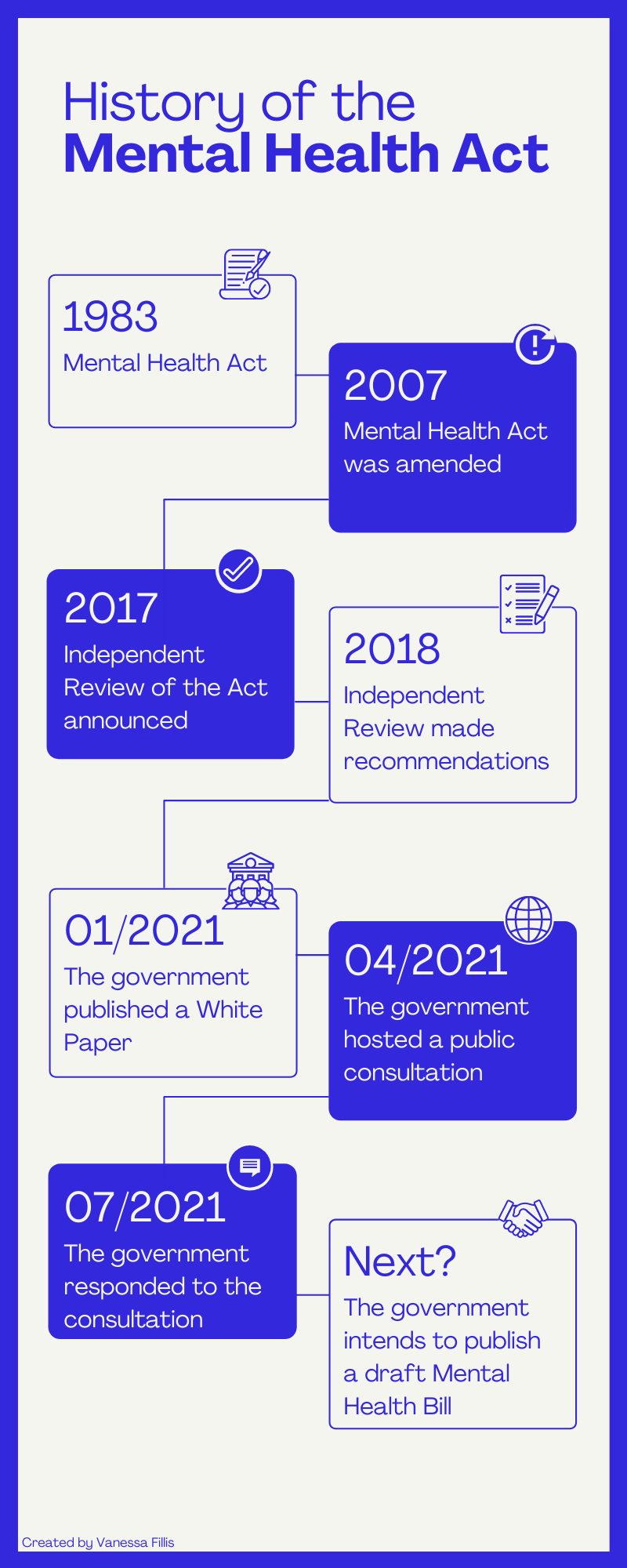The government has published its response to the Reforming the Mental Health Act White Paper consultation last week. What are key issues? And what will happen next?
An overview of what has already happened and why the Act needs to be reformed.
What is the Mental Health Act?
The Mental Health Act 1983 is the main piece of legislation that covers the assessment, treatment and rights of people with a mental health disorder.
It specifies the circumstances in which someone can be detained in a hospital.
Someone can be detained if professionals think their mental health puts them or others at risk. They can be taken to hospital and be kept there against their wishes.
There are different sections of the Mental Health Act that are used for different reasons.
Anyone who is detained has the right to appeal and to get help from an advocate.
What is the campaign to reform the act?
Charities such as Rethink Mental Illness and Mind have been campaigning for the reform of the Mental Health Act for a number of years.
Rethink Mental Illness has been campaigning to improve the Mental Health Act since the 1980s. The charity says:
“The Act is badly out of date as it assumes people with mental illness shouldn't have a say in their treatment, or how their loved ones are involved in their care.”
Why does the Act need to change?
In 2017, a survey by the Mental Health Alliance gathered the views of over 8,000 individuals. This included those with lived experience, families, carers, and loved ones and professionals.
It found that half the participants felt that those detained under the Act are not treated with dignity and that their human rights would not be protected if they were detained.
The charity Mind describes the Act as outdated:
“It was based on earlier legislation and the grounds for detaining people have not changed for many years, even though health care and attitudes towards mental health have changed radically.”
Data shows that since the Act was last amended in 2007 the number of people detained under the Act has been increasing.
Between April 2019 and March 2020, 50,893 new detentions under the Mental Health Act were recorded.
However, the overall national total is believed to be higher.
In 2016/17, the NHS changed the way of producing the Mental Health Act Statistics. This change has had a profound impact on the quality of data and on understanding how the Mental Health Act is being used, says Veena Raleigh, senior fellow, policy at The King’s Fund.
Since not all providers are submitting data or are submitting incomplete data, coverage is incomplete. While 172 organisations have submitted data about the Mental Health Act in 2015/16, the number fell to 104 in 2019/20.
Growing racial disparities
Furthermore, people from Black and Black British groups are more likely to be detained. Data from 2019/20 shows that the rate for Black or Black British people to be detained is higher than in any other ethnic group.
The overrepresentation of some Black and minority ethnic (BME) groups who are detained under the MHA continues to be a particular cause for concern.Care Quality Commission in Monitoring the Mental Health Act in 2018/19
In addition, research has shown that community treatment orders do not reduce hospital readmission rates or stays. Introduced in England and Wales under the 2007 amendment to the Mental Health Act, they are a legal order for compulsory monitoring and treatment of people discharged from psychiatric hospitals within a community care setting.
What has happened so far?

The reform of the Mental Health Act took off in October 2017 when Prime Minister Theresa May announced an independent review of the Mental Health Act.
One year later, the independent review of the Mental Health Act, chaired by Professor Simon Wessely, completed its work and made recommendations for improving the Act. It concluded that the Act does not always work as well as it should for patients, their families or carers.
Earlier this year, the government published a White Paper setting out proposals for the reform of the Act as a full response to the view.
What is the Mental Health Act White Paper?
Based on the recommendations by the Independent Review, the White Paper proposes a wide range of changes to the Act.
These include giving people greater control over their treatment and ensuring that they are treated with dignity and respect. The White Paper also aims to make changes in detention criteria and to improve how people with a learning disability and autistic people are treated by the Act.
Additionally, it sets out that detained patients should have easier access to support and advocacy.
The approach to reform the legislation is shaped by four principles that have been developed by the Review and in partnership with people with lived experience:
- Choice and autonomy: ensuring service users’ views and choices are respected;
- Least restriction: ensuring the Act’s powers are used in the least restrictive way;
- Therapeutic benefit: ensuring patients are supported to get better, so they can be discharged from the Act;
- The person as an individual: ensuring patients are viewed and treated as individuals.
Following the White Paper, the government hosted a public consultation, wanting people’s views on changes to the Mental Health Act “to help put patients at the centre of decisions about their own care”. Between January and April 2021, they received over 1,700 responses from the public while holding 19 policy development workshops to get insights from services users, clinicians and those with lived experience.
According to Rethink Mental Illness, this was considered a key milestone in the campaign to reform the Act. This gave the charity and other supporters the chance to shape the final bill that will be brought forward to parliament and turned into law.
The most recent update was the government publishing its response to the aforementioned consultation.
🗣️ "Today's publication brings us one step closer to positive change."
— Rethink Mental Illness (@Rethink_) July 16, 2021
The government has published its response to the Mental Health Act consultation.
Take a look at our full reaction via this link 👉 https://t.co/hcRlJJ2yS9 pic.twitter.com/QvRESiEUSG
How has the government responded to the public consultation?
The government’s response to the consultation summarises the responses from the public and stakeholders, outlining which proposals from the White Paper will be taken forward.
These include the introduction of the four new guiding principles and increasing the frequency of automatic referrals to the Tribunal. This means that detentions will be reviewed independently from the detaining authority on a regular basis, instead of relying on the patient or their representative to request a review.
Furthermore, the government will take forward replacing the Nearest Relative role with the Nominated Person roleso that individuals can choose who represents them.
Additionally, the eligibility of Independent Mental Health Advocate (IMHA) services will be extended to all mental health inpatients, including informal patients. IMHAs are specialist advocates who are trained specifically to work within the framework of the Act.
Based on the responses to the consultation, there are a number of areas the government will consider further, for example removing the role of the associate hospital managers’ panel in discharging patients from detention.
The government said it will continue to work on the introduction of Advance Choice Documents and advance consent to admission. In Advance Choice Documents, people get the opportunity to set out in advance their preferred care and treatment, the name of their chosen nominated person and any treatments they would like to refuse if they were detained and lacking the capacity to make these decisions.
Advance consent to admission means that individuals get the right to consent in advance to a hospital admission for treatment for a mental illness. If they had given prior consent, they would then be admitted as informal patients instead of being detained.
Generally, the response emphasises that successful implementation of a new Act — and changes to policy more broadly — requires an expansion of the mental health workforce as well as additional funding.
How have campaigners reacted?
Responding to the government’s consultation response to the White paper Saffron Cordery who is the deputy chief executive of NHS Providers said:
“We look forward to legislation that is fit for purpose and reflects what the Government heard during the consultation period being introduced to Parliament as soon as possible.“The government is right to reinforce that a new Act alone will not be enough to improve how and where good quality mental health services are accessed.
“Implementing the Act successfully will require additional funding and workforce expansion. Only with this investment in mental health services and in public health and social, will we be able to address the underlying issues driving the pressures on services and the rising severity and complexity of people’s needs.
“Critically, services focused on better meeting the needs of different parts of the local population, and specifically those from Black, Asian and minority ethnic communities will have an important role to play in reducing the use of the Act.”
Mind welcomes that the government has listened to the views of people with experiences of the Act but criticises that the report does not address racism.
“It is exasperating and shocking however that the report completely fails to acknowledge the structural and institutional racism pervading the Mental Health Act. The report fails to outline how it will address the systemic racism that results in disproportionate detentions and the use of humiliating and life-threatening practices among people from certain racialised communities."Too many people - especially Black men - have died as a result of use of physical and chemical restraint while under the Act and Community Treatment Orders are 10 times more likely to be used on Black people.
What is next?
The government says that it will continue working closely with stakeholders to test and develop its policy proposals further.
It has been said that the government intends to publish a draft Mental Health Bill to be brought forward to parliament in early 2022.
More resources
- More information about your rights when detained under the Mental Health Act by the Equality Humans Right Commission (EHRC).
- This Code of Practice explains how healthcare professionals should apply the Mental Health Act.
- There is an easy read version here.
- There is also an easy read version of the government’s consultation response.
Never want to miss a story again? Subscribe to my newsletter and get notifications for new stories, interviews and data analysis.
